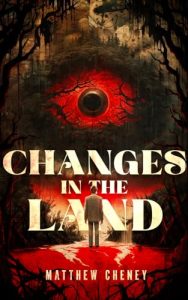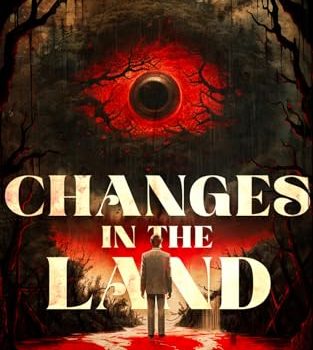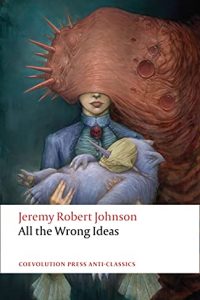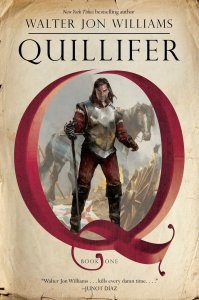Ian Mond Reviews Changes in the Land by Matthew Cheney
 Changes in the Land, Matthew Cheney (Lethe Press 978-1-59021-526-5, $3.00, 90pp, eb) April 2024.
Changes in the Land, Matthew Cheney (Lethe Press 978-1-59021-526-5, $3.00, 90pp, eb) April 2024.
If you read my 2023 Year in Review essay published in the February edition of Locus, you’ll know my favourite collection was Matthew Cheney’s The Last Vanishing Man and Other Stories. I’m not going to repeat what I said about the book other than to note that while the stories tended to be grim and horrific, only a couple were overtly supernatural. One of those, “Hunger”, showed a willingness to embrace the grotesque, stomach-churning aspects of the horror genre. Cheney’s new novella from Lethe Press, Changes in the Land, is not nearly as gory as “Hunger” but retains that same sense of the macabre. Reminiscent of M.R. James or Lovecraft, it’s a story about an academic exploring the history of Adams Park, who gets more than he bargains for, but one where the horrific elements shine a light on the violent legacy of American colonialism, of stolen lands and Indigenous lives lost.
The space afforded by a novella allows Cheney to stretch his storytelling limbs with duelling narratives, toggling between historian Dr. Steven Baird and Elias Thornton, who, along with his family, maintains Adams Park on behalf of the reclusive Valeria Adams. Baird speaks to us mainly through diary entries, though our first introduction is via excerpts from a paper he delivers to the Hoadley Foundation. His interest in Adams Park is sparked by a postcard in his mother’s belongings depicting “a scene from an African safari with the location of the town of Colton, New Hampshire.” In a footnote, he explains how Augustus Adams, the son of an industrialist, bought cheap tracts of land before and during the Civil War that then became Adams Park, a private game reserve hosting “all the famed hunting men of the day.” At some point after 1931, the Park is closed, and records of the Adam’s family “dry up,” leaving a historical hole that Baird is keen to fill. It’s through Elias Thornton that we come to understand that Adams Park is drenched with blood – not only the slaughtered bison and deer, but people, “starting with twenty-seven slaves [Augustus] bought from trades in Mississippi” and later “entire train cars of Cheyenne people… allowing his friends – his colleagues, his peers – to hunt them.” It’s a dark past that Valeria Adams wants to be rid of. But an ancient force has tied her to the family mansion that overlooks the park for well over a century. She can’t leave unless she finds a replacement, a blood descendant. It just so happens that Steven Baird is precisely that person.
In the “Notes and Acknowledgements”, Cheney informs us that Adams Park is modelled on Corbin Park, a private reserve still in operation in New Hampshire established by robber baron Austin Corbin. True, Corbin and his wealthy friends never hunted enslaved people and indigenous Americans, but they did slaughter native animals in their thousands. One of the great ironies of Corbin Park is that it’s one of the few places that protects the dwindling bison population – a direct result of European and American colonialism that dramatically changed the ecology of lands that were never ceded. (The novella’s title is borrowed from William Cronin’s study on the ecology of New England post-European settlement). There are several stunning passages, told from Elias’s point of view, that describe parts of Adams Park untouched by Western civilisation – “the vast spread of forest, meadows, lake, all radiant in afternoon light from a clear blue sky” – and, in doing so, provide a glimmer of a past, a landscape free of cruelty and suffering.
When I reviewed The Last Vanishing Man, I remarked that Cheney’s protagonists, predominantly gay men, often live a solitary existence – either by choice or an inability to connect with others. This recurring motif is a recognition that centuries of prejudice and, more recently, the trauma of the AIDS crisis (wilfully ignored by those in power) weren’t washed away by the growing visibility and acceptance of gay people. We see this with Steven Baird and Valeria Adams, queer characters who find love but now live alone for reasons bound by prejudice, violence, and the ancient force at the centre of this novella. That joint sense of isolation undergirds the narrative. For Valeria, it’s expressed as an intense desire to be free of her family, to rid herself of their guilt and shame. For Stephen, it’s the shocking realisation that he has no one to share his life with, especially during momentous occasions such as the publication of his book. (“You spend all those years working toward this moment, and then the moment comes, and… life goes on. Nobody notices. The clock continues to turn. Traffic keeps moving. Pedestrians in the street don’t all come to a stop and tip their hats to you.”). In digging deeper into his characters, Cheney avoids the typical stereotypes of the horror genre – the stone-hearted, immensely wealthy villain, the gormless academic – and instead proffers up flawed, lonely individuals who connect with us, the reader. As such, when the horrific moments occur, and they do, they have a savage impact. It’s powerful, it’s visceral, and most of all, it’s so damn smart. But then, I wouldn’t expect less from Matthew Cheney.
Ian Mond loves to talk about books. For eight years he co-hosted a book podcast, The Writer and the Critic, with Kirstyn McDermott. Recently he has revived his blog, The Hysterical Hamster, and is again posting mostly vulgar reviews on an eclectic range of literary and genre novels. You can also follow Ian on Twitter (@Mondyboy) or contact him at mondyboy74@gmail.com.
This review and more like it in the April 2024 issue of Locus.
 While you are here, please take a moment to support Locus with a one-time or recurring donation. We rely on reader donations to keep the magazine and site going, and would like to keep the site paywall free, but WE NEED YOUR FINANCIAL SUPPORT to continue quality coverage of the science fiction and fantasy field.
While you are here, please take a moment to support Locus with a one-time or recurring donation. We rely on reader donations to keep the magazine and site going, and would like to keep the site paywall free, but WE NEED YOUR FINANCIAL SUPPORT to continue quality coverage of the science fiction and fantasy field.
©Locus Magazine. Copyrighted material may not be republished without permission of LSFF.








